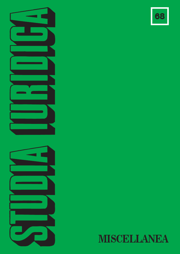Assessment of Selected Working Conditions of Workers
Employed on Drilling and Extraction Platforms in the Light of the European
Union and International Law
Assessment of Selected Working Conditions of Workers
Employed on Drilling and Extraction Platforms in the Light of the European
Union and International Law
Author(s): Magdalena RycakSubject(s): Law, Constitution, Jurisprudence
Published by: Wydawnictwa Uniwersytetu Warszawskiego
Keywords: workers employed on drilling and extraction platforms; non-convention vessels; Maritime Labour Act of August 5, 2015; seafarer; Directive 2003/88/EC; Council Directive 1999/63/EC; working time of work
Summary/Abstract: The paper discusses working conditions of workers employed on drilling and extraction platforms as provided for in the Act on maritime labour of August 5, 2015 (henceforth Maritime Labour Act) from the viewpoint of the their compliance with the European Union and international law.The author examines the problem of classification of drilling and extraction platforms as non-convention vessels in the provisions of the Maritime Labour Act. The analysis leads to a conclusion that, in the light of the Maritime Labour Convention adopted in Geneva by the General Conference of the International Labour Organization (ILO) on February 23, 2006 (henceforth the MLC) and the Act of September 18, 2001 – the Maritime Code, drilling or extraction platforms shall be regarded exclusively as seagoing merchant vessels and as such are covered by the MLC provisions. Workers on drilling or extraction platforms, which at the same time are seagoing ships, should be considered seafarers in the meaning of the Maritime Labour Act.The subject of the analysis covers also regulations concerning the organization of working time, in particular referring to workers employed on drilling and extraction platforms, with respect to its compliance with the EU labour law and the MLC. The regulation of working time of workers on drilling or extraction platforms as provided for in the Maritime Labour Act should be regarded as incompliant with the provisions of the Council Directive 1999/63/EC of June 21, 1999 and the MLC in the scope in which it permits extension of weekly working time to 84 hours and abandoning of the Labour Code provisions stipulating the minimum weekly rest period.The author concludes that the provisions of the Maritime Labour Act have not implemented the Directive 2003/88/EC of the European Parliament and of the Council of November 4, 2003 concerning certain aspects of the organisation of working time (Directive 2003/88/EC).Finally, the author touches upon the issue of judicial protection and asserting labour rights of workers employed on drilling and extraction platforms. The considerations lead to a conclusion that labour courts have the constitutional grounds for applying the MLC with respect to the working time based on primacy of that international regulation over the respective provision of the Maritime Labour Act.Concluding, the author indicates also that the constitutional rule of social dialogue was infringed during in the law-making process concerning the Maritime Labour Act.
Journal: Studia Iuridica
- Issue Year: 2016
- Issue No: 68
- Page Range: 321-332
- Page Count: 12
- Language: English

